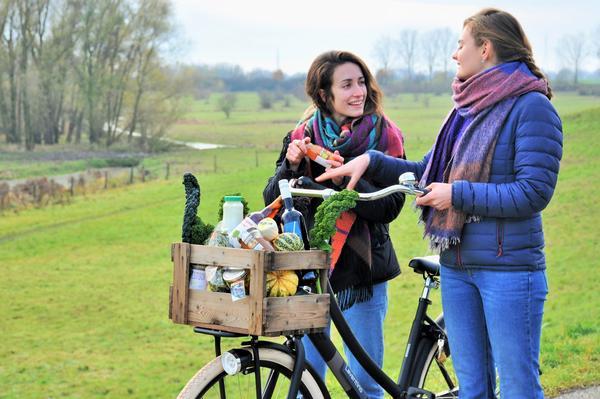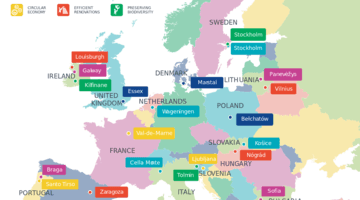Strengthening food governance and biocultural restoration in the Zuid Veluwe bioregion

The focus of the experiment is on food governance and identity in the bioregion (a geographical denominator based on watershed contours) in service of bio-cultural restoration and, ultimately, life. The experiment aims to engage citizens and organizations of the bioregion more actively in the food network and in broader bioregional processes. They will be approached not just as consumers but as political actors who can contribute to living landscapes and regenerative local food economies. The ultimate goal is to enhance capacity for social organization in a way that producers and citizens will jointly carry responsibility for strengthening a sustainable food system and increasing life-enhancing processes in their bioregion.
Local context
The bioregion around the municipalities of Ede, Wageningen and Renkum is characterised by the Veluwe nature reserve, the river Rhine and ancient glacial hills. Hosting sandy soils, clay soils and forest grounds, this peri-urban area has known agricultural activities and experiments for millennia. This was one of the reasons Wageningen University settled here. The socio-cultural impact of this is that a large part of its population has a high level of knowledge of food and agriculture. Many agroecological pioneer farms with specific socio-technical innovations were established here and are thriving. A new independent association of agroecological food producers under the name of StreekWaar, is explicitly committed to strengthening biodiversity, building living soils, and cultivating strong relations with citizens. It is supported by the municipality of Wageningen’s Food Agenda 2021-2030. In short, the bioregion, partly located in the Dutch ‘Food Valley’, is well placed for a social experiment on sustainable food, especially in the context of a heated national debate on the future of agriculture, ignited by nitrogen problems but rooted in systemic and policy challenges related to industrial agriculture.
Specific needs and challenges
The expriment will address the following challenge: Life in the bioregion is threatened by drought, water pollution and loss of living soil and biodiversity. In addition, a collaborative, regenerative culture rooted in an understanding of the interdependence between humans and non-humans is currently lacking in the region. This leads to an absence of a sense of place, which inhibits collective organising. Therefore, the experiment will focus on the following questions:
- How can a regenerative culture be co-created that is in service of the biocultural restoration of the bioregion, enabling abundance, well-being, and life itself? How can 'affect' (caring relations of affection with nature, humans, and non-humans) be nurtured to strengthen relations of interdependency, build a place-based identity, and enable collective action?
- How can a governance system be developed for these processes that includes citizens, chefs, researchers, and others while ensuring farmer autonomy and food sovereignty?
Detailed description of the experiment
Participants in the experiment will start from but go beyond the food producers' community of StreekWaar. A collective understanding of the identity of the bioregion will be developed, along with explicit roles in promoting agroecological food networks and the restoration of the bioregion. Principles for governance will be agreed upon, involving food producers, consumers/citizens, and other actors. This is innovative because it aims to address the risks associated with small-scale agroecological producers and to provide critical societal and environmental services.
The experiment complements existing policies and initiatives in the bioregion and aims to enhance mutual synergies. It strengthens initiatives of the StreekWaar producers network, creates a broader network of active citizens committed to biocultural restoration, and feeds into ongoing debates within national networks about food governance issues and regenerative cultures. The results will be shared with partners in the Shared Green Deal and other bioregional actors and processes in Chile.
Local engagement
The target group for the experiment includes and goes beyond the following actors:
- Local agroecological food producers, including farmers and processors
- Caterers, restaurants, and shops that use and sell local sustainably grown products
- A diversity of citizens in terms of age, profession, and culture, including people with a migrant background
- Students
- Water Board Vallei en Veluwe
- People who work with The Work that Reconnects and regenerative cultures
- Food foresters
- Slow Food
- The municipalities of Renkum and Ede
- National partners such as Toekomstboeren, the national Agroecology Network, and the Voedsel Anders platform
- Researchers from Wageningen University for iterative engagements with ongoing research on short food chains and agroecology
Partners
The partners of the experiment include and go beyond the following actors:
- Agroecological producers association StreekWaar
- Commonland
- The municipality of Wageningen
- Mas Newen Foundation
Additional remarks
Lessons learned will be exchanged with other regional processes in the Netherlands and outside of the EU, notably in Devon, Scotland, and Chile.
Local partner
Gemeente Wageningen
Country
The Netherlands
Number of inhabitants
40,000 in the city and about 150,000 in the region
City
The Zuid-Veluwe bioregion
Website/social media
Contact person:
Janneke Bruil, Food Policy AdvisorJanneke [dot] bruil [at] wageningen [dot] nl
APR 2023
Start of experiment
MAY-JUL 2023
Stakeholder mapping and interviews
AUG 2023
Assembly 1
SEP 2023
Interviews
OCT 2023
Visit to Asfodelo and Assembly 2
NOV 2023
Assembly 3
DEC 2023
Reflection by Transition Committee
JAN 2024
Presentation of biocultural identity
MAR 2024
End of experiment
Related Green Deal Priorities
TIMELINE
Sustainable food: tastes best when shared!
Watch our session taking for a transformative journey into the future of Europe's food system! In this 90-minute open webinar hosted as part of the Local actions...


CONTACT
For further details please contact co-leads Professor Chris Foulds (chris.foulds@aru.ac.uk) and Professor Rosie Robison (rosie.robison@aru.ac.uk).

This project has received funding from the European Union’s Horizon 2020 research and innovation program under grant agreement No 101036640. The sole responsibility for the content of this website lies with the SHARED GREEN DEAL HAS project and does not necessarily reflect the opinion of the European Union.
